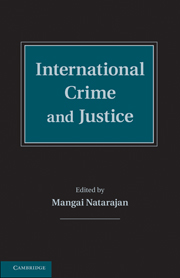Book contents
- Frontmatter
- Contents
- List of Figures
- List of Tables
- List of Contributors
- Foreword
- Preface
- Introduction
- Part I International Criminology
- Part II Law, Punishment, and Crime Control Philosophies of the World
- Part III Transnational Crime
- Part IV Organized Crime and Terrorism
- Part V International crime
- Part VI Delivering International Justice
- Part VII International Cooperation and Criminal Justice
- 54 World Policing Models
- 55 Crossborder Policing
- 56 Challenge and Transition
- 57 The European Union and Judicial Cooperation
- 58 The Longer Arm of the Law
- 59 International Cooperation to Combat Money Laundering
- Part VIII International Research and Crime Statistics
- Part IX International research resources
- World Map
- Index
- References
56 - Challenge and Transition
Policing Developments in the European Criminal Justice System
Published online by Cambridge University Press: 05 October 2014
- Frontmatter
- Contents
- List of Figures
- List of Tables
- List of Contributors
- Foreword
- Preface
- Introduction
- Part I International Criminology
- Part II Law, Punishment, and Crime Control Philosophies of the World
- Part III Transnational Crime
- Part IV Organized Crime and Terrorism
- Part V International crime
- Part VI Delivering International Justice
- Part VII International Cooperation and Criminal Justice
- 54 World Policing Models
- 55 Crossborder Policing
- 56 Challenge and Transition
- 57 The European Union and Judicial Cooperation
- 58 The Longer Arm of the Law
- 59 International Cooperation to Combat Money Laundering
- Part VIII International Research and Crime Statistics
- Part IX International research resources
- World Map
- Index
- References
Summary
EVOLUTION OF THE NEW EUROPE
A description of current and recent developments in European policing necessitates, by way of preface, some outline of the political structures that are evolving in the EU. It was Henry Kissinger who posed the question – when you want to “phone Europe, who do you call?” That was more than thirty years ago. Europe – or the European Union, to be exact – was then a very much smaller place. It comprised nine countries with a population of less than two hundred million using four major languages. Today, the European Union is twenty-seven countries, with more than six hundred million people with twenty-three official languages. How can such a disparate collection of peoples and nations, run a criminal justice system or operate effective policing structures? How can it operate to enforce criminal law across frontiers that have existed in some cases for one thousand years?
Three times more than one hundred years, the nations of Europe went to war against one another and scores of millions of people died, great cities were razed to the ground, whole countrysides were left a wasteland. After the devastation of World War II, a number of far-seeing political leaders, principally Maurice Schumann and Jean Monnet, resolved that Europe would never go to war against itself again. They believed that the best way to ensure this was to build a Europe where resources were held in common, where prosperity of one would be the prosperity of all.
- Type
- Chapter
- Information
- International Crime and Justice , pp. 423 - 429Publisher: Cambridge University PressPrint publication year: 2010



